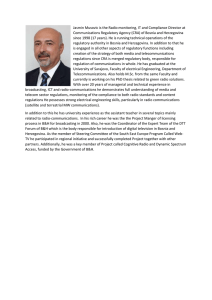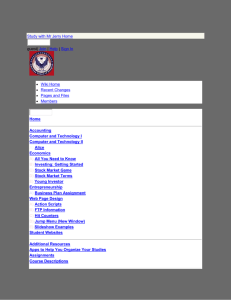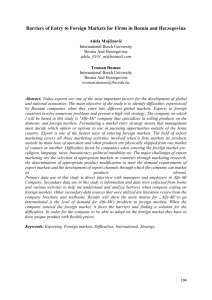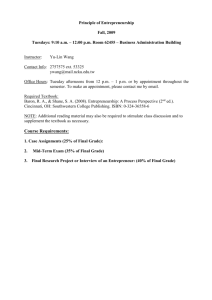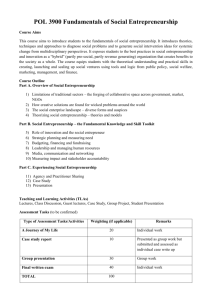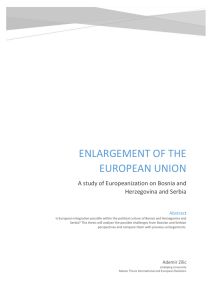click to open
advertisement
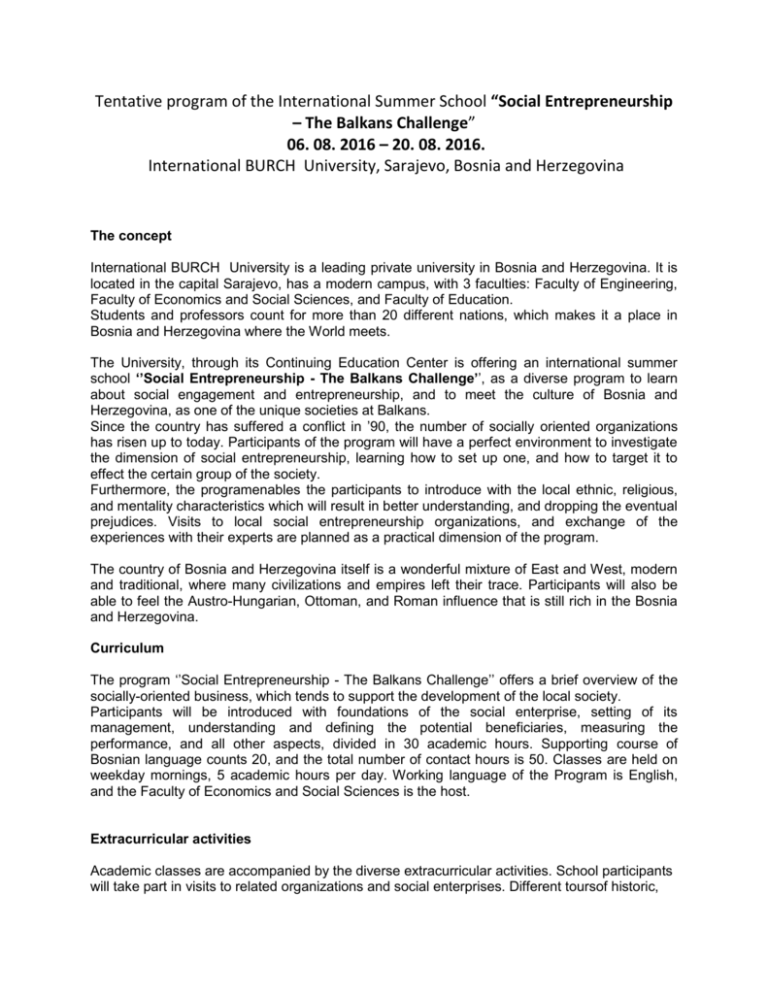
Tentative program of the International Summer School “Social Entrepreneurship – The Balkans Challenge” 06. 08. 2016 – 20. 08. 2016. International BURCH University, Sarajevo, Bosnia and Herzegovina The concept International BURCH University is a leading private university in Bosnia and Herzegovina. It is located in the capital Sarajevo, has a modern campus, with 3 faculties: Faculty of Engineering, Faculty of Economics and Social Sciences, and Faculty of Education. Students and professors count for more than 20 different nations, which makes it a place in Bosnia and Herzegovina where the World meets. The University, through its Continuing Education Center is offering an international summer school ‘’Social Entrepreneurship - The Balkans Challenge’’, as a diverse program to learn about social engagement and entrepreneurship, and to meet the culture of Bosnia and Herzegovina, as one of the unique societies at Balkans. Since the country has suffered a conflict in ’90, the number of socially oriented organizations has risen up to today. Participants of the program will have a perfect environment to investigate the dimension of social entrepreneurship, learning how to set up one, and how to target it to effect the certain group of the society. Furthermore, the programenables the participants to introduce with the local ethnic, religious, and mentality characteristics which will result in better understanding, and dropping the eventual prejudices. Visits to local social entrepreneurship organizations, and exchange of the experiences with their experts are planned as a practical dimension of the program. The country of Bosnia and Herzegovina itself is a wonderful mixture of East and West, modern and traditional, where many civilizations and empires left their trace. Participants will also be able to feel the Austro-Hungarian, Ottoman, and Roman influence that is still rich in the Bosnia and Herzegovina. Curriculum The program ‘’Social Entrepreneurship - The Balkans Challenge’’ offers a brief overview of the socially-oriented business, which tends to support the development of the local society. Participants will be introduced with foundations of the social enterprise, setting of its management, understanding and defining the potential beneficiaries, measuring the performance, and all other aspects, divided in 30 academic hours. Supporting course of Bosnian language counts 20, and the total number of contact hours is 50. Classes are held on weekday mornings, 5 academic hours per day. Working language of the Program is English, and the Faculty of Economics and Social Sciences is the host. Extracurricular activities Academic classes are accompanied by the diverse extracurricular activities. School participants will take part in visits to related organizations and social enterprises. Different toursof historic, religious, and natural sites will be organized within the program. Visits to other cities, such as famous Mostar City is included in the schedule. Syllabus - Social Entrepreneurship – The Balkans Challenge Course description – You will learn tools and techniques for planning a social business. In the first module you will be introduced to the fundamentals of social entrepreneurship. In the second module you will focus on the how the stakeholders are benefiting. The third module builds on the knowledge beforehand to better understand the beneficiaries. Lastly students will build a working model or prototype. Overcome obstacles and measure your customer. Literature – MacMillan& Thompson, The Social Entrepreneur’s Playbook. Note: Book worksheets can be downloaded for free here: The Social Entrepreneur's Playbook (workbook)(Compulsory) Bornstein and Davis, Social Entrepreneurship: What Everyone Needs to Know (Compulsory) Day 1, 2 - What is Social Enterprise? Introduction & Course Overview Core Concepts Social Enterprise Planning Design Thinking for Social Innovation (Case example) Day 3, 4 - Deciding Who to Help and How Performance Criteria Segmentation Introduction to Logic Models How to Build a Logic Model Day 5, 6 - Understanding Your Beneficiaries and their Alternatives Understanding the Beneficiary Operations Realities Operations Requirements Competitive Analysis Day 7, 8 - Testing Assumptions and Measuring Performance Test of Concept Plausibility Performance Measurement Framing and Scoping Cost Table Day 9, 10 - Organizational Form and Stakeholder Management Perspective on Organizational Form: I Perspective on Organizational Form: II Stakeholder Analysis Sociopolitics Summary & Next Steps
